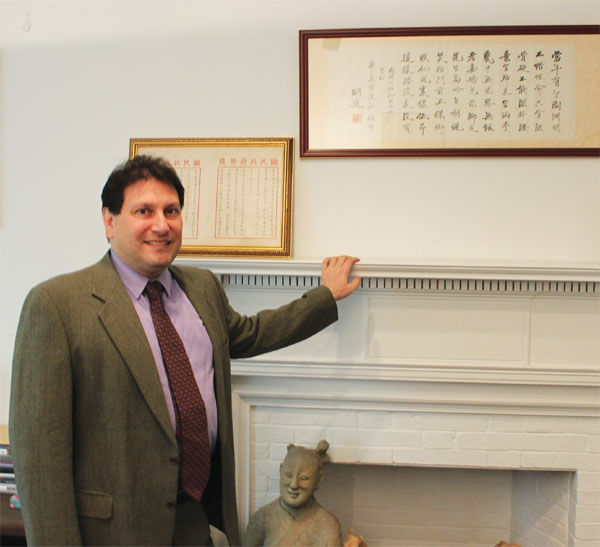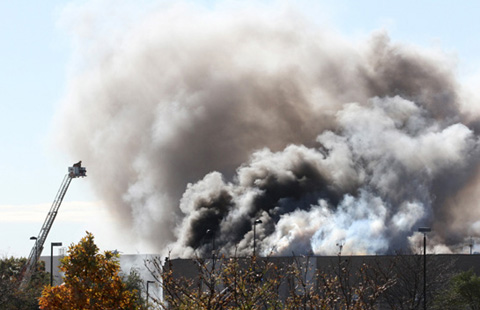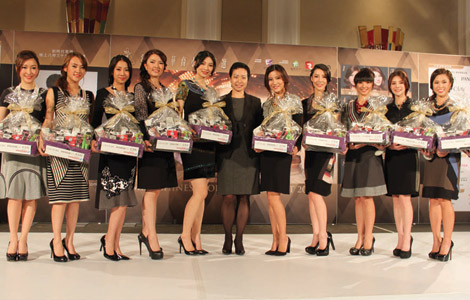CI's New York president ushers in new era
Updated: 2014-10-31 14:03
By Paul Welitzkin in New York(China Daily USA)
|
|||||||||
As the China Institute (CI) prepares to relocate to a new building next year and ushers in a new era, President James B. Heimowitz said the 88-year-old institution remains committed to being a window into China for the United States.
"The China Institute was built on three pillars: culture, education and commerce. We will continue to utilize all three, but especially culture and education, to provide a window into China and deepen ties between the two nations," he told China Daily.
Heimowitz was appointed president of CI in September. He takes the reins of an organization devoted to building a bridge between China and the US.
"I think that's one of the things that distinguish us from other organizations that seek to further China-US ties," he said.
"One of the main founders of the China Institute was Hu Shi who was one of the first Chinese students to study in the US in the early part of the 20th century. He saw the need for an organization to enlighten both populaces about their respective cultures. Most of the other organizations were started by Americans."
With the help of well-known educator and philosopher John Dewey, the China Institute began in 1926 in New York with $25,000 from reparations paid by the Chinese government to the US for the Boxer Uprising, a violent anti-imperialism and anti-Christian movement in China between 1898-1901.
In 1944, the CI's current home, a mansion on East 65th Street, was purchased with funds provided by the foundation of Henry Luce, the co-founder and editor in chief of Time Inc, who also served as president and chairman of the institute's board. CI will move to a building in New York's financial district at the corner of Washington and Rector streets.
"We will be going from 9,000 square feet to over 50,000 square feet," said Heimowitz. "This will allow us to not only continue our innovative educational and cultural programs, but to expand them as well."
Heimowitz said a partnership featuring the Peis - Chien Chung Pei, an architect and son of noted architect I.M. Pei - is spearheading the project. He declined to reveal the cost of the new space, but said it would be millions of dollars and that CI will start a new capital campaign soon to pay for the move and expansion of its programs.
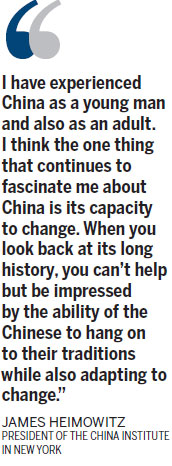
CI relies on cultural and educational programs to promote mutual understanding between China and the US.
"This goes back to our founding. My grandmother attended a class on Chinese cooking at the institute in the 1950s," said Heimowitz. "We may restart the cooking classes in our new space."
CI has a gallery that features exhibitions on Chinese culture and history. The current one - Mao's Golden Mangoes and the Cultural Revolution - explores one of the most unusual events in China's history. It was when millions of Chinese workers started worshipping mangoes in honor of Mao after he received a gift of mangoes from the visiting Pakistani foreign minister in 1968.
Mangoes, then an unfamiliar fruit in China, became a temporary political symbol of Mao's benevolence and love for the people. Illustrations and photos of mangoes appeared in publications, paintings, posters and badges, as well as on everyday objects such as mirrors, quilt covers and enamelware.
The Suzhou Garden, the institute's 1,050-square-foot traditional Chinese rock garden in the mansion's yard, will be relocated to the new building.
On Oct 25, CI hosted a launch party for two new English-language books to teach children about Chinese architecture, history and culture using the Forbidden City as a platform. The Forbidden City was a large complex built in Beijing at the start of the 15th century and was home to 24 emperors until 1911. The books are being published with financial help from the Robert Ho Foundation.
"I think this shows how the institute is trying to make Chinese culture and history more accessible. These books are designed to give children a deeper understanding of China's culture and history in English so that language is not a barrier. We intend to make the books available throughout North America," said Heimowitz.
CI believes that proficiency in the Chinese language can help to improve dialogue between China and the US, as well as contribute to a deeper understanding. It offers classes in Mandarin and programs designed to improve the teaching of Mandarin.
"We have offered language classes for professionals like lawyers and finance professionals who work in both countries. With the move, we hope to expand language instruction to reach a wider audience," said Heimowitz, who speaks Mandarin and Cantonese.
Heimowitz was one of the first US students to attend classes in China in 1980. In 2008 he worked as a media consultant for the Beijing Olympics.
"I have experienced China as a young man and also as an adult. I think the one thing that continues to fascinate me about China is its capacity to change," he said. "When you look back at its long history, you can't help but be impressed by the ability of the Chinese to hang on to their traditions while also adapting to change."
Heimowitz reflected on the transformation he has seen in China since the 1980s:
"One thing that really strikes me is that much of China now has an international look and feel. That wasn't true in the 1980s. It also means we have so much more in common now. Our goal here at the China Institute is to use culture, commerce and education to continue to bring understanding between the US and China."
paulwelitzkin@chinadailyusa.com
|
James Heimowitz becomes president of the China Institute in New York in September. The 88-year-old CI will be moving to a new 50,000 square-foot facility next year, almost six times bigger than its present space. Paul Welitzkin / China Daily |
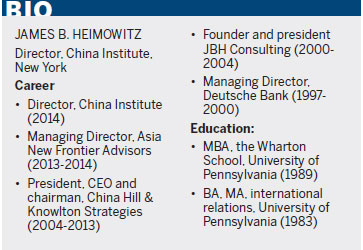
(China Daily USA 10/31/2014 page10)
Most Viewed
Editor's Picks

|

|

|

|

|

|
Today's Top News
China pledges financial aid to Afghanistan
Consensus sought with US on governance of Internet
US experts hope China joins trade partnership
WB report ranks China on business-friendly rules
China to join pro football wars
Mixed bag for China as US Fed ends QE stimulus
Apple's Tim Cook says 'proud to be gay'
Conference conducive to building consensus on Afghanistan
US Weekly

|

|
